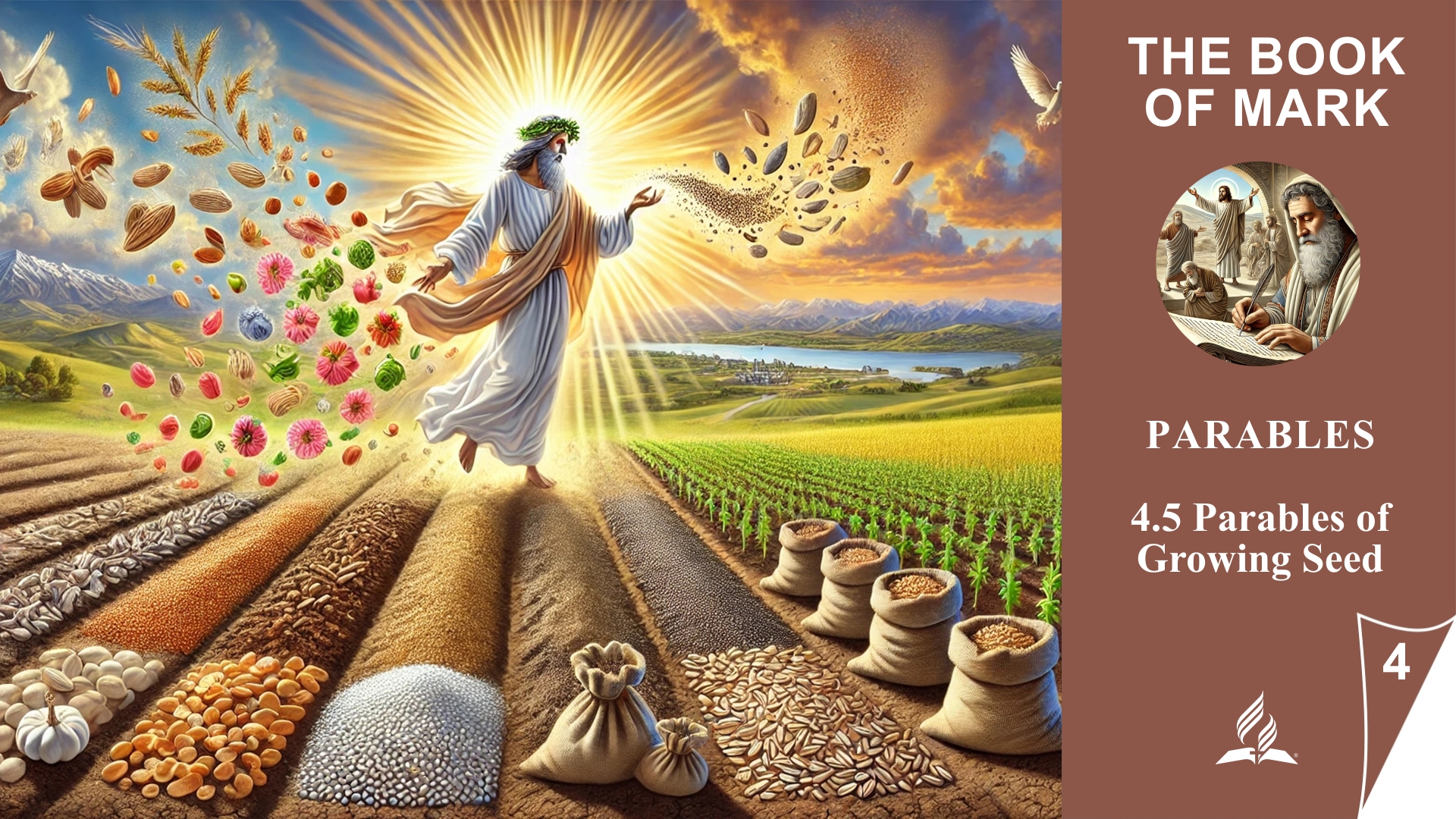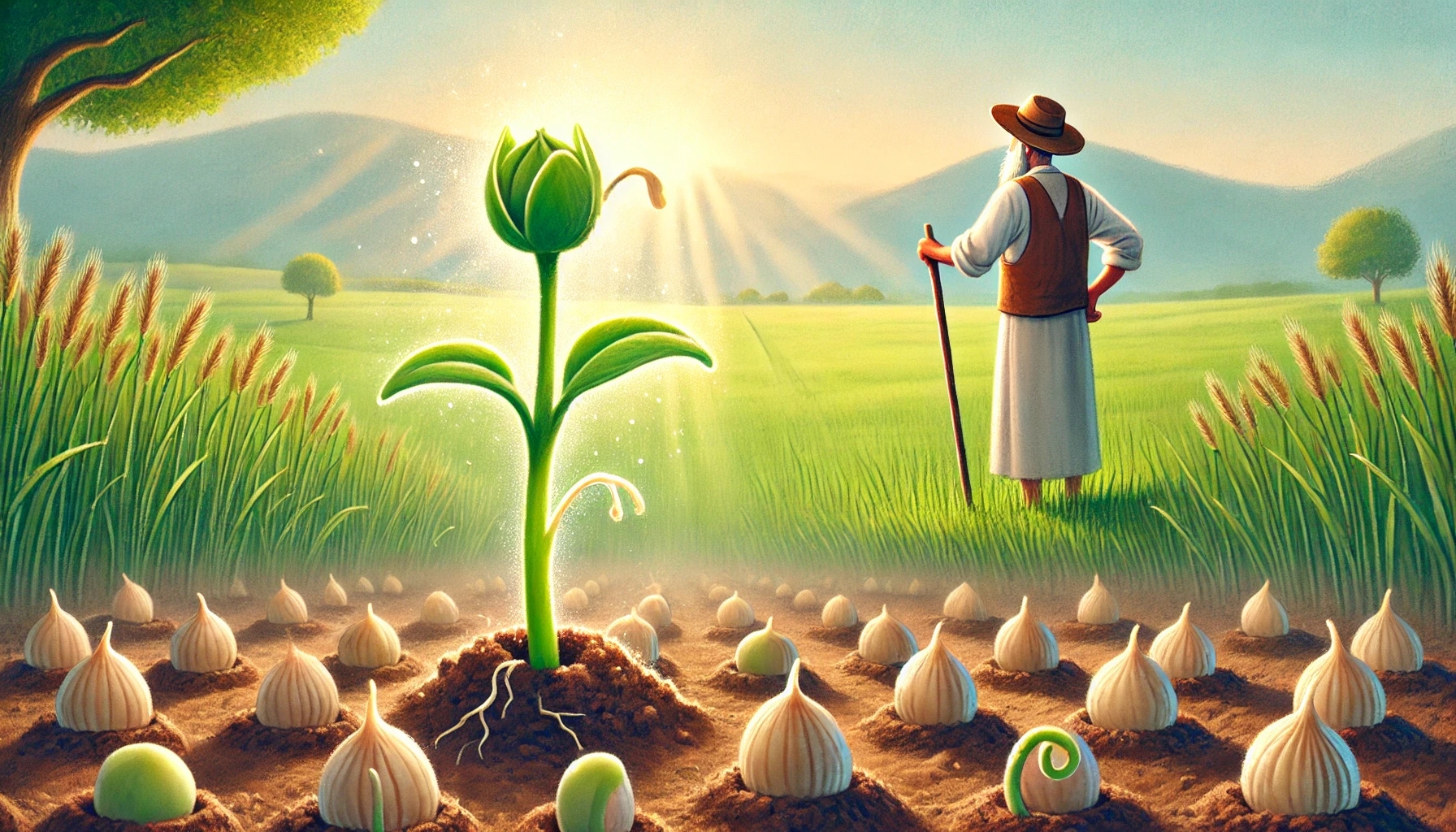


4.5 Parables of Growing Seed
Growth and Greatness of the Kingdom of God
Read Mark 4:26–29. What is the focus of this parable?
Focus of the Parable:
The parable of the growing seed highlights the growth process of the Kingdom of God. Jesus uses this parable, which appears only in the Gospel of Mark, to illustrate the dynamics and mystery of divine workings. There are several central points in this parable:
-
The Growth Process
-
Description of Growth:
-
Jesus speaks of a man who scatters seed on the ground and then goes about his daily work without constantly monitoring the growth process. The seed sprouts and grows “by itself” while the man sleeps and rises.
-
The growth process occurs in stages: first the stalk, then the head, and finally the full kernel in the head. This natural and continuous growth process shows that the Kingdom of God grows in a similar way.
-
-
God’s Work:
-
Although humans play a role in sowing, the actual growth is the work of God. It is a process that often takes place in secret, invisible and imperceptible, yet continuous and inevitable.
-
This growth is mysterious and independent of human intervention. Humans do not fully understand how it happens, but they can see the result.
-
-
-
The Role of Humans
-
Human Participation:
-
Humans play a role in the Kingdom of God by sowing the seed, meaning by proclaiming the gospel and spreading God’s word.
-
After sowing, humans leave the growth to God. It is not their task to control or accelerate the process.
-
-
-
The End of the Growth Process
-
Harvest Time:
-
The parable ends abruptly with the ripening of the grain and the immediate harvest. This symbolizes the sudden and inevitable coming of the end times, the return of Christ.
-
The harvest represents the completion of the Kingdom of God when Christ returns to judge the world and establish his kingdom fully.
-
-
Read Mark 4:30–32. What is the special emphasis in the Parable of the Mustard Seed?
Special Emphasis in the Parable of the Mustard Seed:
In this parable, Jesus emphasizes the amazing transformation and growth of the Kingdom of God. A tiny mustard seed, one of the smallest seeds, grows into a large plant where birds can nest in its branches. This metaphor underscores several important aspects of the Kingdom of God:
-
Small Beginning, Great Growth
-
Tiny Seed, Huge Plant:
-
The mustard seed is only one to two millimeters in diameter and is extremely small. Despite its size, it grows into an impressive plant that can reach up to three meters in height.
-
This drastic growth symbolizes how the Kingdom of God, from seemingly insignificant beginnings, grows into something great and mighty.
-
-
Significance of the Beginning:
-
The Kingdom of God began small and humble, with Jesus and a handful of disciples. Yet this small, humble seed has the potential to become a global movement reaching millions of people.
-
-
-
Metaphorical Meaning
-
Birds in the Branches:
-
Jesus mentions that birds nest in the branches of the mustard plant. This is an allusion to Psalm 104:12 and Daniel 4:10–12, where trees provide shelter and nourishment.
-
This metaphor emphasizes that the Kingdom of God will be a refuge and a source of life for many. It will be large and expansive, providing shelter and home for many.
-
-
Divine Power and Creation:
-
Psalm 104 speaks of God’s power in creating the world. Jesus uses this symbolism to show that the growth of the Kingdom of God is also based on divine power and action.
-
Like the great tree in Nebuchadnezzar’s dream in Daniel 4, which provides shade and nourishment to the whole world, the Kingdom of God will be comprehensive and life-giving.
-
-
“And this gospel of the kingdom will be preached in the whole world as a testimony to all nations, and then the end will come” (Matthew 24:14). Consider what the community looked like when Jesus made this prediction. Why is this a remarkable and faith-strengthening prediction for us?
Small Beginnings, Great Promise:
-
Small Core: The first community consisted of a small group of disciples and followers of Jesus. These people had little influence and were politically and socially marginalized.
-
Great Vision: Jesus prophesied that the gospel would be carried to the whole world. This vision was enormous, considering the humble beginnings of the Christian movement.
Contrary Circumstances:
-
Roman Empire: Christianity arose in a time and region dominated by the Roman Empire, which encompassed numerous religions and philosophies. The spread of a new religious movement seemed unlikely.
-
Persecution and Resistance: The first Christians faced numerous persecutions and resistances. Despite these challenges, Jesus promised that their message would be spread worldwide.
Divine Action:
-
Divine Power: The spread of the gospel from a small, insignificant beginning to a worldwide movement shows the working of God. This strengthens faith as it proves that God’s plans are fulfilled despite all human obstacles.
-
Testimony of Faith: The fulfillment of this prophecy serves as a powerful testimony to the truth and reliability of Jesus’ words. It shows that God is in control of history and faithfully fulfills His promises.
Missionary Mandate:
-
Inspiration for Believers: Jesus’ prediction motivates believers to continue spreading the gospel. It reminds us that every believer plays a role in carrying the message of God’s kingdom into the world.
-
Universal Reach: This prophecy emphasizes the universal nature of the gospel. It is meant not only for a specific group or nation but for all peoples.

Connection to Our Daily Life and Faith
-
Patience and Trust in the Growth Process:
-
Daily Life: This parable teaches us that even small beginnings can lead to great successes. In our daily lives, we should be patient and trust in small steps and humble beginnings.
-
Faith: Spiritually, the parable encourages us to trust in God’s plan. Even if the Kingdom of God starts small, it will grow and flourish through God’s power.
-
-
Importance of Each Individual’s Contribution:
-
Daily Life: Every small contribution counts. Our daily actions and decisions, no matter how small they may seem, can have long-term significant impacts.
-
Faith: Every believer has a role in the Kingdom of God. Our prayers, acts of charity, and dedication to the gospel contribute to the growth of God’s kingdom.
-
-
Hope for Completion:
-
Daily Life: The idea of harvest time reminds us that all processes, even long and arduous ones, will eventually come to an end. This gives us hope and motivation to keep going.
-
Faith: The harvest time symbolizes the return of Christ and the completion of the Kingdom of God. This hope for the ultimate kingdom of God gives us strength and endurance in our faith journey.
-
These parables teach us patience, trust, and the importance of our small contributions in God’s grand plan. They encourage us to trust that God will accomplish His work and remind us of the great hope we have in the Kingdom of God.

Even small beginnings can grow into something great through God’s work – trust that every small contribution counts and that God ensures the growth.
Visited 76 times, 1 visit(s) today






